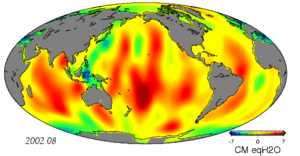GloBio summarize the results as:
"Natural systems that support economies, lives and livelihoods across the planet are at risk of rapid degradation and collapse, unless there is swift, radical and creative action to conserve and
sustainably use the variety of life on Earth. That is a principal conclusion of a major new assessment of the current state of
biodiversity and the implications of its continued loss for human well-being." Here is an image of potential global tipping point areas:
This will be presented for the
UN General Assembly in the fall of 2010.
The principal conclusions on biodiversity futures for the 21st century:
- Projections of the impact of global change on biodiversity show continuing and often accelerating species extinctions, loss of natural habitat, and changes in the distribution and abundance of species, species groups and biomes over the 21st century.
- There is a high risk of dramatic biodiversity loss and accompanying degradation of a broad range of ecosystem services if the Earth system is pushed beyond certain thresholds or tipping points.
- Earlier assessments have underestimated the potential severity of biodiversity loss based on plausible scenarios, because the impacts of passing tipping points or thresholds of ecosystem change have not previously been taken into account.
- There are greater opportunities than identified in earlier assessments to address the biodiversity crisis while contributing to other social objectives; for example, by reducing the scale of climate change without large-scale deployment of biofuels and accompanying loss of natural habitats.
- Biodiversity and ecosystem changes could be prevented, significantly reduced or even reversed if strong action is applied urgently, comprehensively and appropriately, at international, national and local levels."
Here is the full report.
 Image via Wikipedia
Image via Wikipedia
![Reblog this post [with Zemanta]](http://img.zemanta.com/reblog_e.png?x-id=4cc9106f-15c9-49a6-b4e4-3a3b2640701e)

![Reblog this post [with Zemanta]](http://img.zemanta.com/reblog_e.png?x-id=d1d61a4d-7708-41e8-93b6-75755d87ffb8)